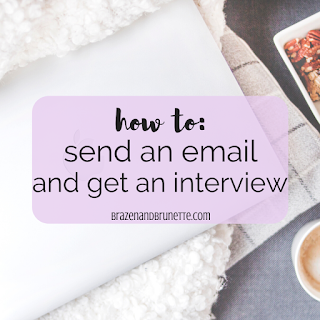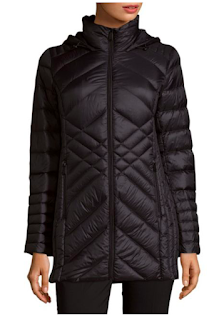Hi y'all! So today's post is part 4 to my job-searching series and I am SO sorry that it has been over a year since I blogged about this! To catch you up real quick if you've forgotten in the past year, part 1 was over the resumé, part 2 was over the cover letter, and part 3 was a guest post all about OCI's.
I really think the follow-up email is underrated but can be very powerful. In fact, I actually know that the only reason why I even got called for an interview was because of my follow-up email. I'm pretty confident in this email because a recruiter for the company I interned in-house with in Dallas my 3L is who gave me a template for exactly what he wants to see.
I've included my email at the end but I'll color-coordinate the parts I'm about to break down so you can scroll back and forth between what I said and why I said it.
Timing the follow-up email
This can be tricky to time. You want to give it enough time after sending in your resumé and cover letter that you don't look desperate. But you also don't want to wait too much time and miss your opportunity because they already found someone for the position by the time you send it in. For me, it was easy because I didn't get around to applying for jobs until about a week before I got bar results, so I used that as an excuse to send a follow-up email. But if you're more together than me, I'd suggest either 3 or 7 days.
Ideally the purpose of the email is that whoever is doing the hiring will have posted a job or put out word that they're hiring and are being flooded with so many resumés that they all blur together, so you are sending them a reminder of what makes your resumé stand out. Think of it as a polite "hi, remember me? still interested. k, thx" but more professional.
Hit the high points
Your follow up email should have one goal: be a highlight reel of your resumé in a way that reflects the job listing. That's the focus! So if you start to feel like you're just regurgitating your resumé, step back and start over. You have to assume that this hirer is getting 50-100 emails a day and while standing out is nice, they'll only notice you stand out if you actually make the email in a way that they'll actually finish it.Yep, the recruiter that helped me admitted that usually he doesn't finish the follow-up emails he gets because after 5 seconds he can tell if they're not going to be worth his time. And the ones he actually finishes? If you impress him enough that he actually finishes your email, and then have a solid resumé and cover letter that he actually gets through (or at least thoroughly skims), you're pretty much guaranteed an interview.
Use mirroring psychology
So what is a hirer looking for? I already told you, they want exactly what they're asking for! AKA, they want someone who fits the description they put in their job posting. So if the job uses words like "organized" or "team player," then your email should use "organized" or "team player." Don't get fancy and try to use synonyms. This isn't HS English; there's something psychological that connects you to their firm if you use the same words.Don't think too much into this. You don't have to force their job posting into your email by putting every single adjective you see. Just pick the few that are relevant to your experience and tie them together. For example, you could say "assist junior associate with memos by researching and organizing relevant case law."
You'll see in the email I sent that I tried to use the description of the job as a model to explain my experience. Here was the actual job posting I responded to:
One last thing, if you're like me and never know what is supposed to go in a subject line, mirroring saves you again! Just put the title of the job posting as your subject line. This way, they know exactly the purpose of your email before they even open it.
Make it readable
I'm talking beyond no typos. Remember, this is like a first impression, you only get a few seconds and then your reader is probably moving on. So don't be afraid to use resumé-style bullet points. These make it quick and easy for the hirer to find the high points and decide if you catch their eye or not.
And put a little effort into it! If the job listing just says to send it to the Hiring Partner at jobs@firmname.com, don't just address it to Hiring Partner if you can help it. Get on LinkedIn and look up that firm and figure out who is the hiring partner. If that doesn't work, figure out who's is over the department you're applying to or who is the most senior person at the firm. Anything to show you went the extra step to make you stand out from the other generic greetings.
Lastly, remember to keep it short and sweet. Your cover letter and resumé are already enough words they'll have to read, so don't add on to that. A few purposeful sentences do a much better job than half-though paragraphs.
Remember to actually use this to follow up
Don't just send them an email and expect them to remember you and your resumé. And definitely don't assume they're going to take the time to go back through the stack of resumés and cover letters on their desk to give you a re-read. Just like the bullet points, a main purpose of this is to make it easier on them to want to invite you for an interview.
Absolutely include both your resumé and cover letter as attachments to the email. And reference them! It's a big pet peeve for most people when an email includes an attachment with no context to the attachment whatsoever. How do I know opening this random attachment that's just thrown in there won't give my computer a virus? Also, it's sloppy to just throw that in there and assume they'll figure out why it's included.
Finally, the email I actually sent that got me an interview and later hired:
Subject: Associate Attorney position
Mr. Abbott,
I hope this message finds you well. I wanted to send you an update to let you know that since applying for the Associate Attorney position on October 19th, I have passed the Bar and soon will be licensed to practice in Texas. I know your time is valuable, so here are three quick reasons why I'd be a great addition to your workers' compensation practice.
- I have the research and drafting skills to draft filings and the experience to negotiate with opposing counsel.
- As a certified and experienced mediator, I am ready to handle our client's mediation appointments.
- I have experience in client intake, answering legal questions, and providing counseling regarding potential legal outcomes.
If you think I'd be a good fit, I encourage you to review my attached resume and cover letter. Thank you for your time and consideration and have a great day.
Best,
Nikki Boyd
(email and phone number)







































